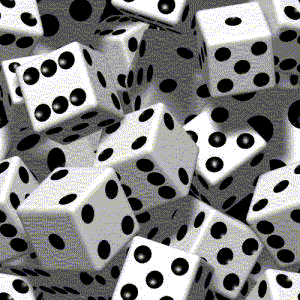
I'm working on the concept of "probability" with my math students these days. We began with a discussion that was close to their hearts (and their parent's pocketbooks!). Which cell phone company do you use? 8 out of 20 of them use Verizon. Many of the other cell phone companies were represented in our small class sample, but there's a better chance you're a Verizon user in my class than if you're not.
These students are now "sensitized" to Verizon users on campus. They take random polls whenever they can: in the lunchroom, in the hall between classes, on the bus. They are very aware now and wonder if there are others just like them. Chances are they will meet more and more kids who are Verizon users.
Why?
Not because the roll of the dice says so, but because they've exploded the sample size. The more people you ask, the better the chances that you will find what you're looking for - someone who thinks and acts just like you!
As a teacher, I am one of hundreds of thousands. If I have a concern, chances are I will look for another teacher who thinks like I do and work it out with them. Teachers talk to teachers. Parents talk to parents. Kids talk about both of us to each other. But if you are a parent and you have a problem with a teacher, how does talking to another parent get you what you need? It's like if you are a Verizon user and have a problem with your plan; would you talk to a TMobile user about it? How productive would that be?
First you need to decide what it is you're looking for: answers or empathy? You're already sensitized to others who think like you do, and you know they'll "understand" your plight. But that may not get the job done - nothing may change.
Chances are that you will get more of what you really need if you explode your sample size. Probability and statistics are more valid and reliable if they can be replicated in a larger sample.
Is what you're experiencing a common experience, an usual experience, or one that has been hiding just under the radar because no one has ever paid attention to it? You won't know unless you take a chance and do what my students did - ask anyone and everyone you run into about their experiences.
